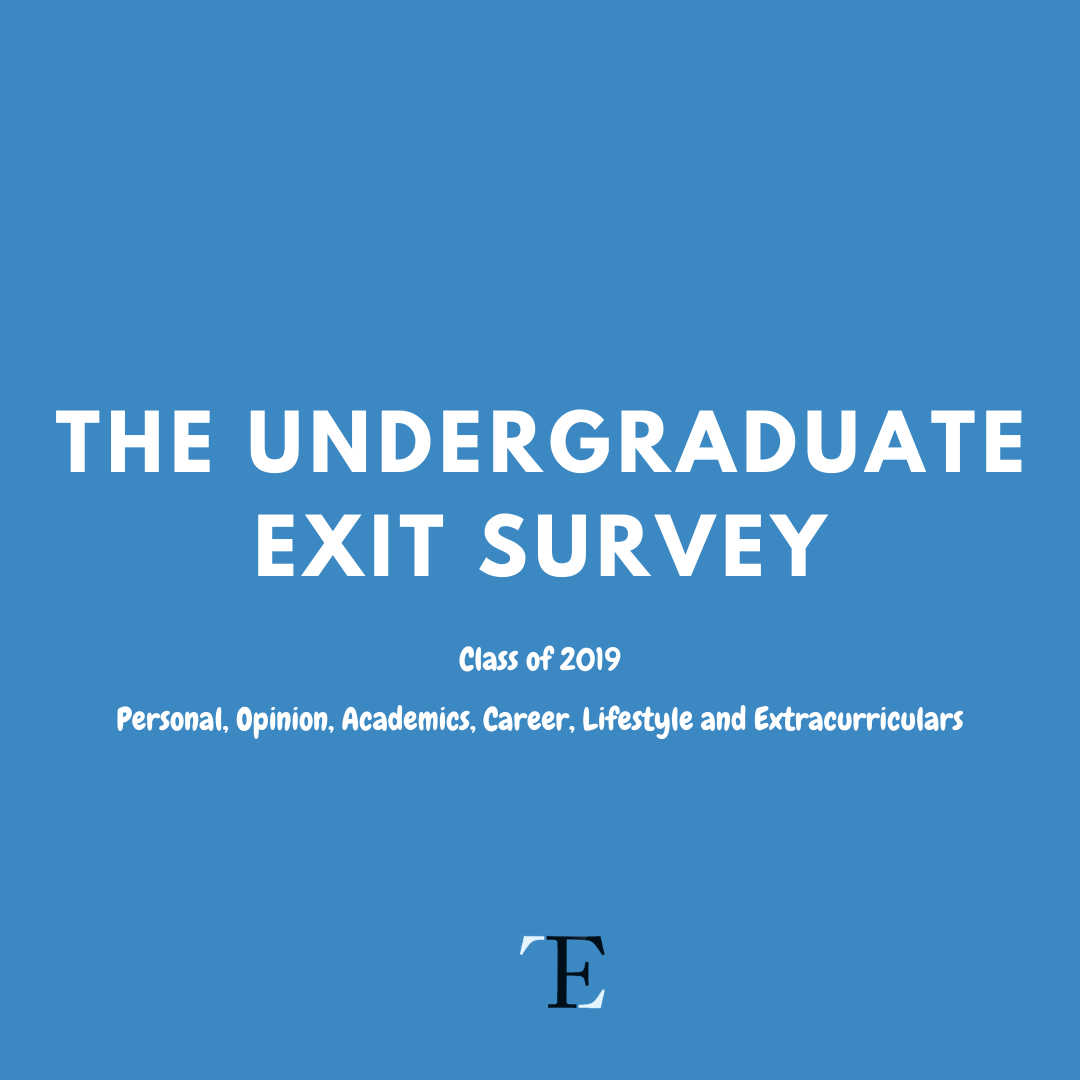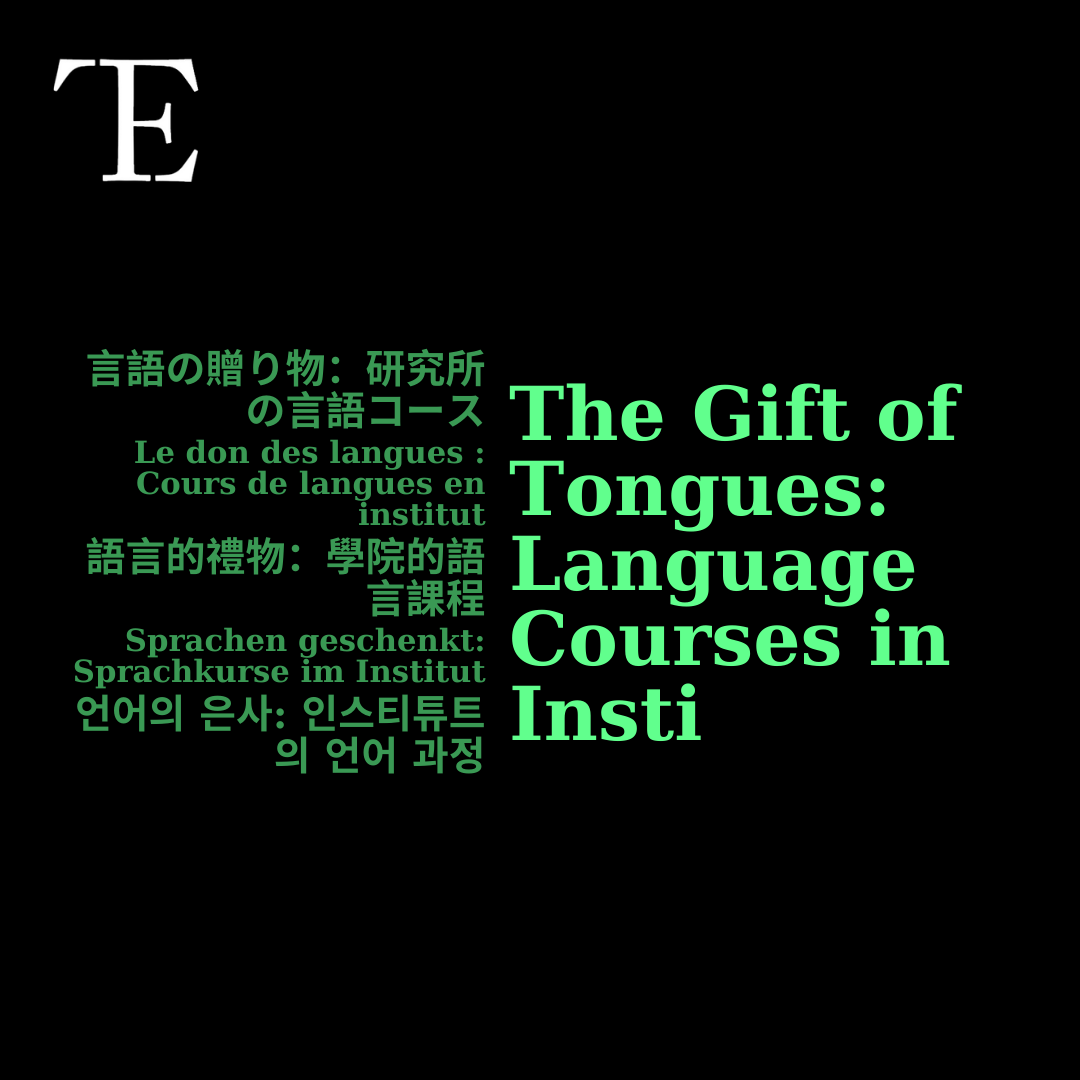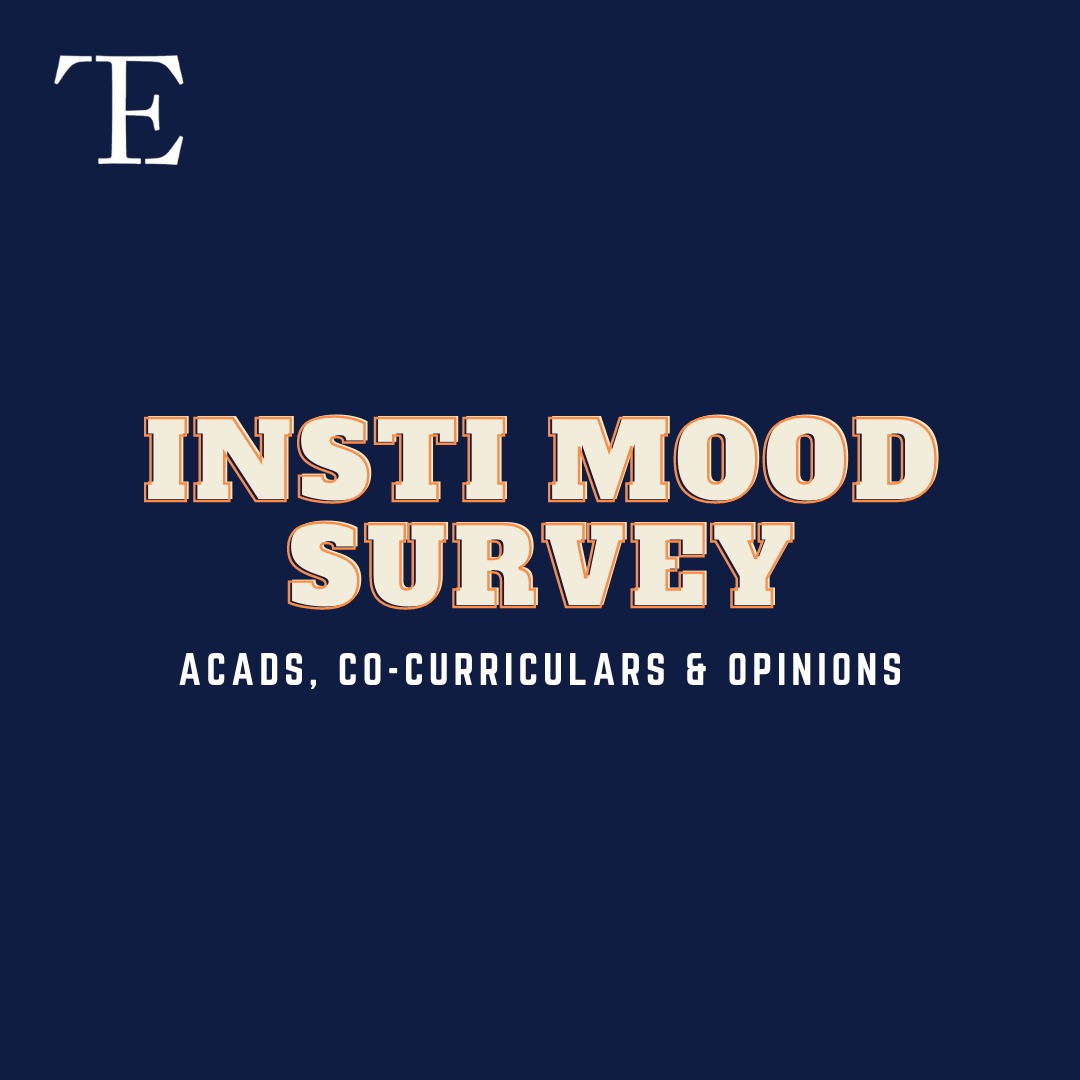The Undergraduate Exit Survey was conducted online in September 2019 – during the week in the lead-up to the convocation – for the 2019 UG Class (BTech + DD + MA). The survey consists of 5 parts: Personal, Extracurricular Activities and Academics, Career, Lifestyle & Opinion. The survey was anonymous, and all the questions in the survey were optional. Barring a few questions, most of the respondents (around 220) answered all the questions in the survey. For questions where this was not the case, we have duly indicated the same. Some questions allowed multiple answers. The survey was inspired by the wonderful work by our peers at Insight in IIT Bombay. You can have a look at their survey here.
This article is prefixed with a narrative, and followed by the statistics for each question. To skip directly to the questions, click here.
Design by Shreethigha Ganeshan. Survey by Nishant Prabhu and Niharika Gunturu.
Part 1: Academics
Inferences
Henceforth, we use the term ‘students’ and ‘survey respondents’ interchangeably.
45.2% respondents just wanted to sail through their academic life. 35.6% consider their efforts sincere, but feel they could’ve done much better. This could be indicative of general disinterest in content offered by departments. The possible reasons? Perhaps the shifting interests towards non-core fields like analytics, finance, business intelligence, etc. or computer science related fields due to high paychecks compared to most core fields.
In response to questions on the attitude towards academics, the following grievances were expressed:
- Relative grading system induces unhealthy competition in some scenarios.
- Students disliking (to the point of absolutely hating) their department, often wishing to have been a part of another stream. Some of the responses are quoted verbatim:
-
- Being mentally troubled and being unable to focus on acads, making it a horrible experience overall
- “Felt as if it would lead to my death if i[do] not keep academic results away[from] my life. It almost killed me and left[scars] in my life and my wrist.” Others mentioned that “acads”, for them, “were unbearable.
-
A small fraction of the respondents didn’t maintain good relations with their family. This could be both a cause and an effect of poor academics.
Core/Non-Core and Branch Change
32.7% students would have chosen another department if they knew as much about their department as they know now. Most people wished to move to CS (followed by CH and EE), while a few wished to not apply for engineering, and one respondent admitted “maybe NIFT”.
Many respondents took electives from non-core fields (47.6%); about half of those simply wanted to stay away from their core field. 47.1% students identified their academic workload as a hindrance towards their goals, rather than being a supplement. A lot of people want to move into CS, EE, ME and CH. Opportunity security in India or less/more interesting academic workload could be popular reasons.
Many of them, however, were satisfied with their branch and did not want to apply for BC.
Interdisciplinary Dual Degrees
Many students opted out of IDDD because they didn’t want to spend more time in insti. Although this could have multiple meanings, one of them could be indicative of fatigue from the academic system.
Many students also could NOT take up IDDD because they didn’t have enough CGPA.
A sizeable proportion of respondents did not find the courses interesting.
Learning and Attendance
73.8% of respondents found less than 50% of all courses they enrolled in useful from a learning perspective.
Only 6.4% of them found more than 80% of the courses useful. When asked how often they would attend classes if the attendance rule was waived, a large section said they would attend all classes of courses they like. A few would never attend classes, and a few more would attend all of them.
Part 2: Personal
Inferences
In total, we had around 220 respondents, which leads us to believe that nearly 1 in every 4 students in the 2019 UG Class (BTech + DD + MA) answered the survey. The male:female ratio among the respondents roughly seems to be 6:1, which is much higher than the institute UG ratio (which is closer to 10:1).
Proximity infatuation has affected many people (56.4%), roughly half of who went ahead with their relationships while the other half never asked. A good number of people also found dating against their values. These are perhaps the people from conservative homes who led a conservative life here as well.
The end of a relationship has troubled most respondents. Fortunately, most of them were able to move on within a few weeks. About a quarter of them remained troubled for a semester or longer.
About 31.3% were unaffected (it is possible that in such cases the respondent probably had backup, or that the cause for the breakup was linked to infidelity). Socializing with people from diverse cultural and linguistic backgrounds doesn’t seem to be a trouble for most people. Among the respondents, we have more introverts than extroverts, and a large section changes their behaviour based on situation. Most respondents didn’t find a change in this personality trait after their entry into IITM.
Many suffering from proximity infatuation couldn’t express their feelings to the opposite gender (or same, in rare cases). This sometimes seems to be a cause for distraction and poor attention towards academics. Also, too much time devoted to the relationship can also turn out to be unhealthy for people who have crossed the first hurdle.
Most people know students from the opposite gender as casual acquaintances or close friends. This indicates that insti is relatively liberal in allowing free interaction between the two groups (this is a problem in some societies).
Part 3: Opinion
Inferences
Hostels and Mess
71.6% of the respondents found their rooms satisfying. However, about 17% found their rooms small and cramped. 64% were satisfied with quality of mess food. 18.6% detested the food being served at mess. 1 respondent conceded that they liked the food a lot.
128 respondents (79%) feel that the consumption and circulation of narcotics deserves disciplinary action.
Surprisingly, from the options given, the offence second to most deserving of DisCo was plagiarism in exams/assignments (38.3%).
Also, only 13% of respondents feel sanctioning/requesting proxy attendance deserves disciplinary action.
Unsurprisingly, a majority of the respondents (63.3%) feel despondent with regards to elections in the institute, conceding that they are ridden with regional and linguistic bias. An overwhelming majority of respondents (81%) gave the inter-hostel rivalries and associated culture a score below 3 (out of 5). This trend continues with a majority of respondents rating their enthusiasm for LitSoc and TechSoc (44.7% and 47.6% respectively) at a dismal 1/5. On average, there is a slightly higher enthusiasm for LitSoc over TechSoc among the respondents. Enthusiasm for Schroeter, however, takes a stark departure from LitSoc and TechSoc. Only 34.9% of respondents rate it at 1/5 whereas a whopping 17.2% rate it 5/5. These statistics seem to be in tune with the present inter-hostel culture in the institute.
Elections
63.2% respondents voted regularly in institute elections. Of these, 39% never studied the candidature of the nominees. For the next question, 63.3% candidates responded that elections are ridden with regional and linguistic biases. This could mean the following: regular voters are either part of the regional group dominating the elections, or those who make random votes or vote based on hearsay. 12.6% respondents revealed themselves to be indifferent towards the system, while 8.7% responded that it would be better to eradicate the system entirely than to continue with the current setup.
Grievance Redressal
When asked how easily students were able to voice concerns that warranted the attention of authorities, most respondents gave an average score. Very few people (8.5%) found themselves freely able to voice concerns. This might be stemming from the manner in which student representatives are being elected.
Part 4: Career
Inferences
Many respondents conceded that they were moderate to well aware of the career opportunities they had as an IITian. Despite this, many people are unsure about what they will be doing 5 years down the line. Currently, most popular options are higher studies/research or engineering in industry.
Several respondents conceded that they had time to go through the opportunities they had as an IITian, with a significant number of them saying they didn’t utilize the time.
This confusion possibly stems from disinterest in academics, when they do not find themselves interested in it (and additionally, if they don’t know what they are interested in either), they get lost and are unable to think about what to do next. In such a scenario, a tremendous amount of time is spent working towards nothing in particular, even though one could’ve browsed through the opportunities that they have. Another possibility is that the respondents looked at all plausible opportunities, but didn’t like any of them. This brings fear with confusion, and students generally shy away from seeking help.
Most people say their source of career fundaes were seniors. Very few of them consult faculty, while some consult the internet. This could be dangerous because many seniors ticked off “giving unsolicited fundaes to freshies” in their bucket-list.
Quite a few people want to move out of India for career opportunities. Does India not have enough? Does India not pay enough? What is “enough”, really?
Part 5 : Lifestyle and Extracurricular Activities
Inferences
Lifestyle
Pulling an ‘all nighter’ is the most common achievement (89.2%) followed by visiting the department building terrace (72.6%) and playing Wolf (72.2%). Pondi is the most popular trip location (57.1%) followed by Mahabs (54.7%). A large fraction of people like cycling to Bessy (65.6%).
In total, about 300 instances of misbehaviour and looting by monkeys were reported by the respondents of this survey.
86 of the respondents admitted to have lived on the edge at some point of time, barely missing a W grade. Most people have two or three meals a day. About 17 people conceded to having only one meal on an average per day. 1 respondent mentioned that he had no meals on an average day. 152 respondents mentioned that they skipped meals in mess more than twice a week to dine elsewhere. About 62 respondents skipped mess meals less than twice a week which could have a possible connection with mess food quality.
About 121 respondents skipped breakfast more than 4 times a week, with 66 (30.8%) never having visited the mess before 12.00 pm. Only 35 respondents have always had breakfast.
91 respondents never involved themselves in active physical fitness activities. 78 people were casual sports-persons. About 46 people were regularly involved in fitness activities through NSO or gym.
116 people proudly mentioned that they bathe regularly. 65 respondents bathe less often in a week while 33 respondents had personal hygiene very low on their priority list.
Saathi, Social Life and Mental Health
135 respondents (65.2%) were unhappy with the Saathi mentorship system: having either never met their mentor, never received quality help or were completely dissatisfied with their interactions. Only about 11 people conceded that they greatly benefited from the system.
About 84 people found themselves ready able to socialize because their acquaintances were proficient in English. 65 respondents initially faced trouble but could overcome that and socialize well. About 33 people stuck to friend circles who spoke their native language. A few responses included that they hardly made friends and they can pick up multiple languages easily.
About 189 respondents mentioned that they could lead a very liberal life in insti, of which 104 came from conservative families.
About 7 people felt that campus life was very restricting while 12 people led a conservative lifestyle similar to their homes.
96 people found themselves satisfied and happy about the time they spent here. 69 people conceded to feeling stressed during intern and placement seasons. 9 people revealed that they regularly experienced long bouts of stress and sadness of which 16 sought professional help. 46 of the respondents avoided Mitr’s help or intervention. 25 of these gave it a try but were disappointed while the remaining 21 avoided it due to public perception of Mitr. About 15 of them had a positive experience.
Alcohol and Nicotine
74.1% of the respondents said they began consumption of alcohol after their freshman year. 14.8% respondents began alcohol consumption in their freshman year. A total of 108 of 218 respondents said they consumed alcohol (49.5%), which might have been possible due to the liberal lifestyle they found at their disposal in insti.
91.5% of the students proudly said that they do not smoke. On the other hand, 3 of the participants revealed that they smoked more than a pack per day.
Most common habits which students pick up during their stay in insti includes participating in extracurricular activities (50.9%) and missing classes (50.9%). About 40% of the respondents faced pressures of being in a relationship while about 33% felt the urge to cheat on exams and plagiarize assignments. Only about 10% respondents faced peer pressure for consumption of narcotics.
Extracurricular Activities and Positions of Responsibilities (PoRs)
Shaastra (43.3%), Saarang (41.8%) and Center for Innovation (27.9%) were the most popular PoR choices for this batch.
Student governance (17.4%), Sports Organizing Committee (16.9%) and Saathi (16.4%) were other popular choices.
Most people took up these PoRs because they were interested in the work done by the team (42.5%) while other prevalent reasons included making new friend circles (14.9%), career profile enhancement (11.6%), peer pressure (10.5%) and suggestions from seniors (9.9%).
When asked if their PoRs had helped them achieve any career goals, responses were uniform between “very less” to “a lot”, with “very less” getting more responses.
136 respondents (77.7%) revealed that PoRs helped them grow as a person, although some of them conceded that their contribution was less than they had expected. About 11% found themselves have made a significant contribution to the PoR but not having grown personally.
The Questions
















 With regard to voting in institute elections, which of the following statements do you think describes your participation the best?
With regard to voting in institute elections, which of the following statements do you think describes your participation the best? What is your opinion of insti elections? Choose the option that you feel most strong about.
What is your opinion of insti elections? Choose the option that you feel most strong about.




















































